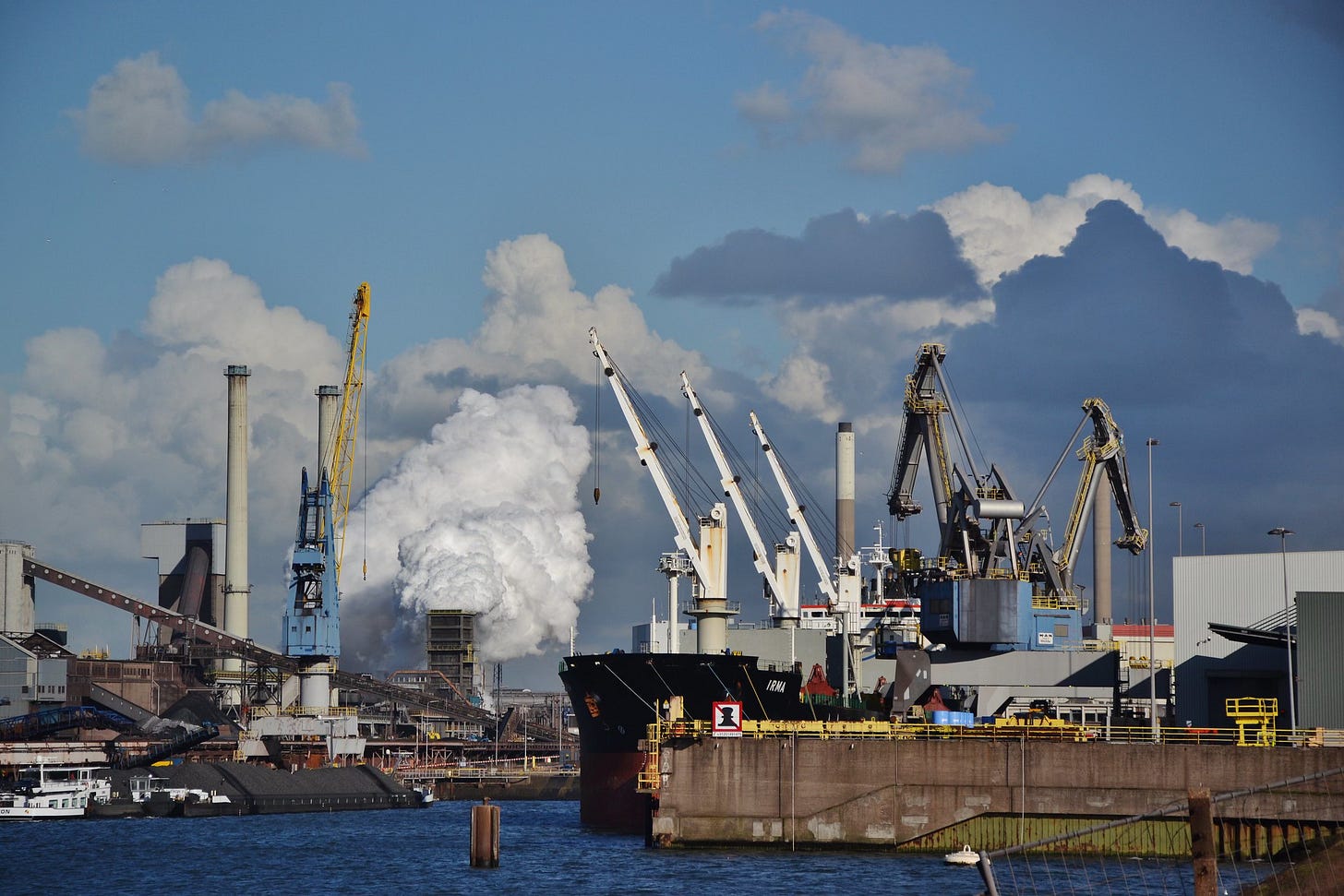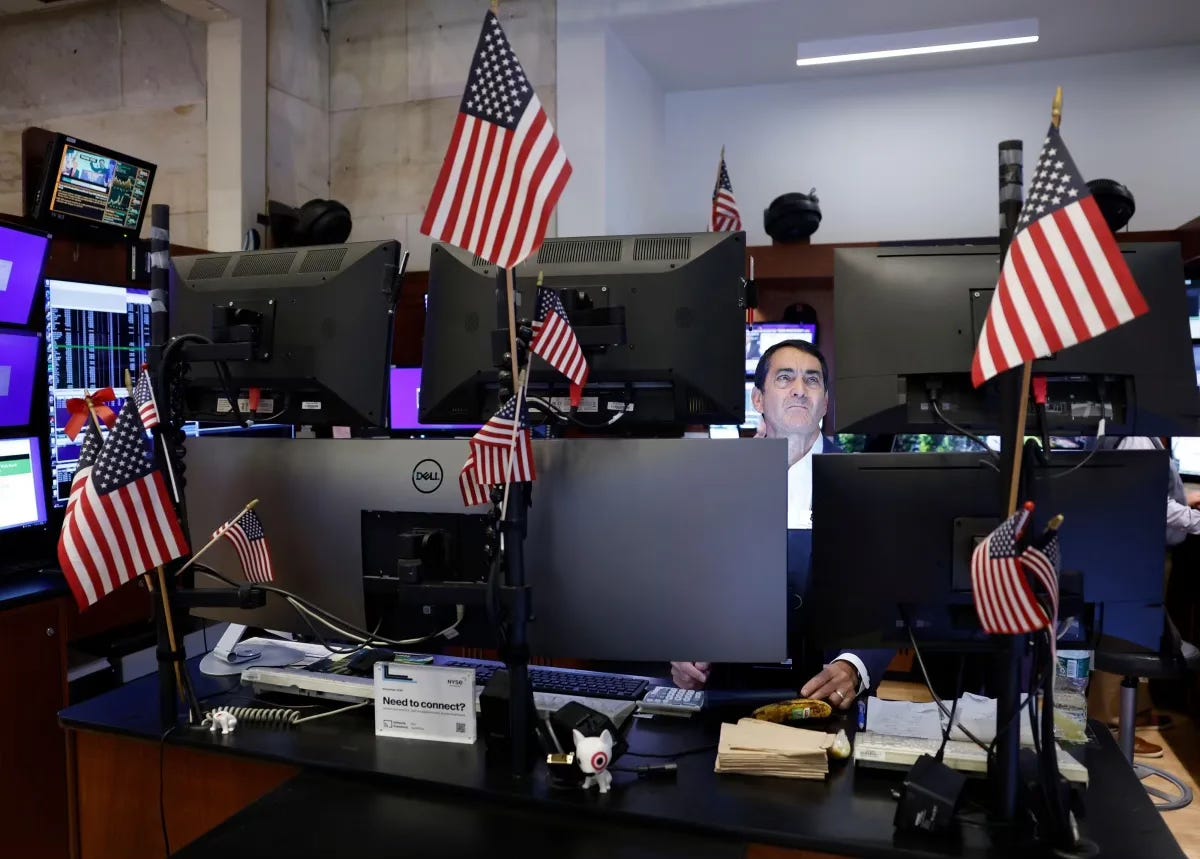Britain's steel industry faces bigger threats than Trump's tariffs
Since the 1970s, no other country apart from Venezuela has seen its steel production fall faster than the UK.
Steelmakers across the world are preparing today to weather the storm of a Trump-initiated tariff war - one that would deal another blow to a British industry already facing a highly uncertain future.
In his latest burst of protectionism, the US president has announced that he will whack 25 per cent tariffs on all steel and aluminium imports entering the US.
It’s not the first time Trump has imposed 25 per cent tariffs on imported steel - he did the same in 2018 to protect US producers. Nor is he the only leader to introduce protectionist policies on this vital material. Under Biden’s presidency last year, amid concern that an abundance of cheap steel from China was making it tough for American rivals to compete, the US tripled its tariffs on Chinese steel. Mexico and Brazil also introduced levies against steel imports last year, while the EU launched an “anti-dumping investigation” into Chinese tin-coated steel products.
Why the urgency to cultivate and safeguard a domestic industry? Because steel is deemed important for national security.
It is a critical component of a whole host of military equipment, from warships to helicopters to ammunition, hence Trump’s insistence this week that America “needs great steelmakers, great aluminium makers for defence.” Britain’s Strategic Defence review has also recognised the importance of maintaining strong supply chains for steel across the UK.
Steel is also vital because it is a foundational industry that supports countless other sectors including construction, housing, nuclear energy, the automotive and aerospace industries. Steel plays an important role too in Britain’s transition to a low-carbon economy since it’s a vital component in wind turbines and EVs. (Somewhat ironic given that Britain’s steel industry is struggling in part due to the challenge of transitioning to greener production that is also cost-effective.)
In the early 1970s, the UK was the second-largest steel producer in Europe. British steel still supports 33,000 jobs and retains a reputation for being of high quality. However, since the 1970s, no other country apart from Venezuela has seen its steel production fall faster than the UK.
Britain is not one of the biggest steel exporters to the US. Canada is by far the largest, followed by Brazil and Mexico. About one-tenth of Britain’s total steel exports were sent to America in 2024.
Even so, UK Steel, the trade association that represents the industry, warned today that a 25 per cent tariff on British shipments would deal “a devastating blow” for the sector, adding that America is Britain's second largest export market after the EU. It also urged the UK government to “act decisively” to stop other countries dumping excess steel on the UK if they can no longer ship it to the US.
While Trump’s tariffs pose a fresh challenge to British steel, they shouldn’t distract from what poses a far bigger threat to the industry’s survival: the cost of energy.
Steel production and processing is incredibly energy-intensive, and power costs can represent up to 180% of steel producers’ Gross Value Added (GVA) in the UK.
UK Steel warns the British steel industry is being “crippled by high industrial electricity prices”, which are considerably higher than its European counterparts and “place a heavy burden on the industry’s competitiveness”.
In 2023-2024, UK steelmakers’ energy costs (per megawatt hour) were almost twice that of their German and French competitors.
What to do?
Phil Tomlinson, from the Centre for Governance, Regulation and Industrial Strategy, says that governments in other countries have lent greater support to their domestic industries by subsidising energy costs for steelmakers. Though he also points out that state support is complicated, not least because much of the industry is now foreign-owned. In the last few years, several foreign companies, such as Indian-owned Tata, have faced financial difficulties and sought state subsidies. But, politically, this is difficult since it means UK taxpayers essentially bailing out overseas shareholders.
Public procurement will also be important, says Tomlison, who backs an overt government policy of favouring British-sourced steel for the pipeline of any new UK infrastructure projects.
Some ministers are already pledging to do just this, such as defence secretary, John Healey, who insists “for too long, ministers have failed to ensure defence equipment is built in the UK”.
Though such an approach is never going to bear fruit unless there are enough sites in the UK producing steel and delivering it at a competitive price. Which brings us back to the vital challenge of tackling high energy prices.
Caitlin Allen
Deputy Editor
ON REACTION TODAY
Ian Stewart
Who made money in 2024?
Anthony Peters
Trump has got markets dancing a fandango
ALSO KNOW
Uncertain future of hostage/ceasefire deal - Hamas announced today that it is delaying the release of any more Israeli hostages until further notice, accusing Israel of breaching the Gaza ceasefire agreement by “delaying the return of displaced persons to northern Gaza, targeting them with shelling and gunfire in various areas of the Strip, and failing to allow the entry of humanitarian aid in all its agreed-upon forms”. Israel has labelled the decision a "complete violation" of the deal which began last month.
Rushdie trial begins - The trial of a man accused of stabbing British-American author Sir Salman Rushdie at a book event in August 2022 - leaving him blind in one eye with a damaged liver and paralysed hand - began today in Mayville, New York. Hadi Matar, 27, has pleaded not guilty.
Britain’s jobs slump - The volume of job openings in the UK dropped for the 15th month in a row in January and at the fastest rate since August 2020, according to KPMG. Vacancies for temporary workers also fell sharply.
UK may alter online harm laws - Downing Street is willing to renegotiate elements of Britain’s Online Safety Act in order to swerve tariffs from Donald Trump’s administration, reports The Telegraph. The law, which regulates online speech, is thought to be heavily disliked by the president’s administration because it can levy massive fines on US tech companies.
FIVE THINGS
Elon Musk’s rapid disassembly of the US government, in The Verge.
The Standard sums up this weekend’s Kanye West meltdown on X, which led to the controversial artist being removed from the social media platform.
Can Birmingham ever escape its punchbag status? Will Lloyd in The Times
The Spectator asks why won’t Ireland take in Palestinian refugees?
How China is at the heart of Trump’s tariffs on steel and aluminium, in The New York Times.





